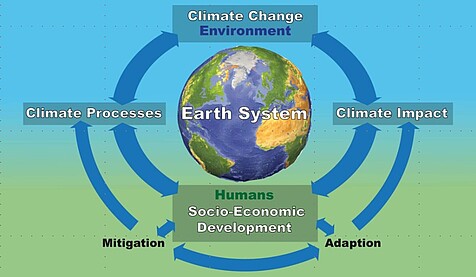Earth and Climate System Science Master’s Program
Understanding the earth and climate system
Earth and Climate System Science Master’s Program
Be part of the solution, and join the “Earth and Climate System Science” program
Join our interdisciplinary and research-oriented “Earth and Climate System Science” Master's program, where we address the challenges resulting from the current state of the climate and provide you with the skills and understanding needed to develop sustainable approaches to protect our planet. For this purpose, we apply simulations of regional climate, agricultural and economic models, as well as conduct unique measurements in the field. The focus of our program lies on the fascinating interactions of the earth system’s various components, including the atmosphere, soil and vegetation, which can intensify extreme weather events and modify regional climates
What you can expect
- Train your skills of communication and persuasion in our lively debate seminar
- Learn how to operate and analyze regional climate models
- Create weather forecasts and climate simulations by means of data assimilation
- Learn how to conduct earth system observations and climate studies with remote sensing methods
- Link natural sciences with economic models
| Degree Master of Science |
4 semesters 120 credits |
University places unlimited |
Language English |
Location Stuttgart |
|||||||||||||||
Degree program content
To get everyone up to speed, the first semester consists of learning the fundamentals and basic skills needed for earth system sciences in a series of compulsory modules. Right from the second semester onward, you can choose elective modules too, depending on your chosen research specialization – a unique aspect of this course.
During your third semester, you will also have the opportunity to conduct research at an ELLS partner university or to undertake a semester abroad within the ERASMUS program.
In Hohenheim you can choose from 3 specialization profiles, each containing a package of elective modules, tailored according to their subject matter:
Profile 1: Earth System Processes – Observation and Simulation
Profile 2: Agroecosystems and Food Security
Profile 3: Sustainability and Environmental Resources
Information about the individual modules can be found in the module catalog.
Study objectives
As a graduate of our "Earth and Climate System Science" program, you will stand out through your technical skills, deep knowledge of the earth system and application of the scientific method. Furthermore, your interdisciplinary mindset and innovative approaches to problem solving will give you the confidence to apply for, and be successful in a broad range of rewarding careers. Whether you choose to continue your academic career, as many of our previous students have done, or go into industry, this program will give you the skills to excel.
What you should bring with you
The formal requirements for the Master's program are:
- Bachelor (180 ECTS) in the field of natural, earth, or agricultural sciences
- English B2
You can find detailed information on the formal requirements in the admission regulations.
Apply by 15 March (international students) or 15 May (German students) for the winter semester and secure a place.
That's not enough for you? Here you will find further opportunities to develop your skills and contribute ideas.
Acquiring new skills
With the AI & Data Science Certificate Hohenheim (AIDAHO], you can acquire additional skills in artificial intelligence (AI), data science, and scientific computing, expanding your specialist knowledge on a cross-faculty basis.
In the Innovation Greenhouse, you can get involved in start-up ideas or implement your own ideas with other interested students and scientists from all departments.
The Language Center offers courses in Scientific English and other foreign languages.
In the third semester (or the second semester, if appropriate), you have the opportunity to complete a semester at another German or foreign university. In particular, we cooperate with the University of Hamburg as part of the “Integrated Climate System Sciences” degree program.
Our partners also include all the universities in the Euroleague For Life Sciences, such as the BOKU in Vienna and Wageningen University.
If you have further questions on stays abroad and internships abroad, the Student Mobility Team can assist you.
What makes our MSc ECSS so special?
- Demonstration of and exercises on globally unique 3D laser remote sensing systems for measuring atmospheric water vapor and temperatures
- Excellent supervision ratio with focus on research and teaching
- Demonstrations and exercises with globally unique technology on-site in modern laboratories and practical rooms
- Opportunity to participate in international field campaigns on land-atmosphere coupling with the participation of NASA and NOAA in the USA
- Participation in the new DFG “Land-Atmosphere Feedback Initiative” (LAFI) research group and its measurement campaign at the University of Hohenheim
- Fascinating field work as part of our Land-Atmosphere Feedback Observatory (LAFO)
- Potential to participate in international measurement campaigns, e.g. TEPEX-E in the tropical Pacific
- Good reasons for studying at the University of Hohenheim
Where could you go from here?
Many of our students have gone on to start exciting careers, like project coordinator in climate protection, supervisor in biodiversity management, CEO (start-up AI/GIS), agricultural advisor, consultant in climate adaptation and mitigation regulations, data scientist, PhD candidate in climate change research, and many others.
- Research activities in the field of earth and climate system sciences (meteorology, environmental physics, geosciences, etc.)
- Consulting work in the public sector, private sector, and non-governmental organizations
- Activities in international and bilateral organizations active in the field of development aid
- Development aid
- Science journalism
All about ECSS
This degree program is run by the Institute of Physics and Meteorology (IPM) at the University of Hohenheim with many colleagues from all faculties. Teaching and research at the University of Hohenheim is embedded in top national and international research programs such as
- the World Climate Research Program WCRP
- the Global Energy and Water Exchanges (GEWEX) Program
- the GEWEX Land-Atmosphere System Study (GLASS) Panel
- with its international GEWEX Land-Atmosphere Feedback Observatory (GLAFO) project, which is headed by Prof. Wulfmeyer at the University of Hohenheim
- Earth System Modeling and Observations
- of research group 5639 “Land-Atmosphere Feedback Initiative” (LAFI) of the German Research Foundation (DFG)
- Land-Atmosphere Feedback Observatory (LAFO)
- the Intergovernmental Panel on Climate Change (IPCC)
| Application deadlines | |
|---|---|
| First subject-related semester | Only for the winter semester:
|
Higher subject-related semesters | Winter semester:
|
| Requirements | |
|---|---|
| Formal requirements | Bachelor's degree in natural, earth, or agricultural sciences (180 ECTS credits) |
| Language skills | English B2 |
| Selection procedure | |
|---|---|
| Selection criteria | none |
It is possible to apply to a higher subject-related semester for the winter semester (application deadline: 15 May) and in exceptional cases for the summer semester (application deadline: 15 January). | |






